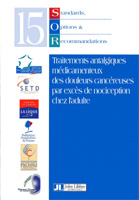(for any order > 35€)
The National Federation of Centres for Combating Cancer (FNCLCC) and Regional Centres for Combating Cancer (CRLCC), in cooperation with partners from the public sector (general and teaching hospitals), the private sector and some professional societies, have been working since 1993 on drawing up a list of recommendations for clinical cancerology practice known as “Standards, Options and Recommendations” (SOR).
The occurrence of pain depends on the type of cancer and the stage it has reached. At the time of diagnosis and in the early stages of cancer, 30% to 45% of patients suffer pain ranging from moderate to severe on evaluation scales. This percentage rises to an average of 75% in the advanced stages. Among patients experiencing pain, 40% to 50% report pain of average to high intensity, while 25% to 30% describe their pain as very severe. A hard-to-estimate number of patients who have been cured of cancer continue to suffer pain as a result of the cancer and/or treatment.
Dealing with cancer-related pain should be a matter of constant concern to doctors.
Analgesic drug treatment based on patients’ evaluation of their pain relies partly on recommendations made by the World Health Organisation. Nonetheless, significant changes are suggested in this book (titration methods, use of new opioids, rotation), which also includes a summary of recent pharmacological data and legal information.
Au sommaire :
Les Standards, Options et Recommandations
Synthèse des recommandations de la FNCLCC (Fédération nationale des centres de lutte contre le cancer)
Introduction
Les antalgiques de l’échelle thérapeutique de l’OMS
Réglementation de la prescription, dispensation et administration des médicaments classés comme stupéfiants
Fiche pratique infopioïde médecin. Utilisation des opioïdes en cancérologie adulte.
Fiche pratique infopioïde patient. Utilisation des opioïdes en cancérologie adulte
Annexes
Réfrences
Index
